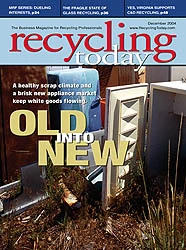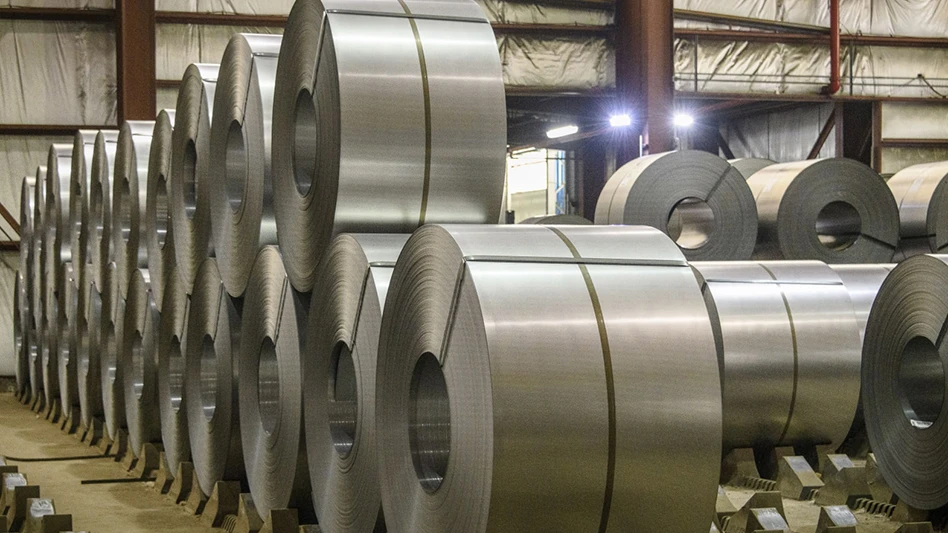MBA POLYMERS ENTERS EUROPEAN JOINT VENTURE
MBA Polymers Inc. (MBA), Richmond, Calif., and Müeller-Guttenbrunn GmbH (MG) of Amstetten, Austria, have formed a joint venture company to build and operate a plastics recycling plant in Kematen, Austria. MBA owns 51 percent of the joint venture, and MG owns 49 percent.
The new company MBA Polymers Austria-Kunststoffverarbeitung GmbH will process highly mixed plastics resulting from the legislated take-back and recycling of durable goods, such as appliances and electrical equipment, which takes place on a large scale in Europe.
MBA and MG expect the processing plant, with a capacity of 40,000 tons per year, to come on line shortly after the August 2005 mandated implementation of the EU-wide WEEE (Waste Electrical and Electronics Equipment) take-back and recycling legislation.
The plant complements a similar plant being constructed in Guangzhou, China, through a join venture between MBA and Guangzhou Iron and Steel Enterprises.
The plant will be located next door to MG’s advanced metal recycling operations METRAN and will be between large feedstocks from the durable goods recycling infrastructure developing in Western Europe and the growing manufacturing and plastics molding base in Eastern Europe.
Biddle says that during the last 10 years, MBA has worked with government agencies, trade organizations and various industries "to provide a better home for the plastics from end-of-life durable products and to provide the manufacturers with ‘green’ materials for their new products," helping to create more sustainable manufacturing in the automotive, appliance, computer and business equipment and electronics industries.
MBA Polymers is headquartered in Richmond, Calif., where it carries out R&D and operates a large pilot plastics recycling facility.
Müller-Guttenbrunn is the largest metal recycling company in Austria. Its headquarters and largest recycling plant are in Amstetten, Austria, but it also operates in Hungary, the Czech Republic, Slovakia, Romania and Liechtenstein.
NEPSI NEARS A CONSENSUS
After years of meetings, stakeholders from the electronics manufacturing and retailing segment, the solid waste/recycling industry and the environmental sector through the National Electronic Product Stewardship Initiative (NEPSI) have agreed on many key aspects to handling obsolete electronics.
Cat Wilt, NEPSI program director and a University of Tennessee senior research associate, told attendees of the E-Scrap 2004 Conference in Minneapolis in mid-October that NEPSI soon may be willing to make recommendations for U.S. legislators to bring before Congress.
But the source of disagreement, the financing mechanism, is critical. "There is recognition that a NEPSI agreement [isn’t] possible until this is resolved."
NEPSI participants are considering a funding arrangement with a visible fee at the point of sale that provides flexibility in how the funds collected are managed. Some manufacturers could use collected fees to run their own take-back programs, while others could contribute to a pooled program.
Ultimately, Wilt said NEPSI "gathered a tremendous amount of data. I think there will be a national solution [and] I think NEPSI laid the groundwork for it."
Wilt says NEPSI stakeholders have virtually agreed that no further agreement is likely. She said the group’s goal is to provide recommendations to federal legislators by late January 2005. Wilt says several members of Congress are "very, very interested in this issue; I get calls from staffers regularly."

Explore the December 2004 Issue
Check out more from this issue and find your next story to read.
Latest from Recycling Today
- Fitch Ratings sees reasons for steel optimism in 2025
- P+PB adds new board members
- BlueScope, BHP & Rio Tinto select site for electric smelting furnace pilot plant
- Magnomer joins Canada Plastics Pact
- Out of touch with reality
- Electra names new CFO
- WM of Pennsylvania awarded RNG vehicle funding
- Nucor receives West Virginia funding assist





